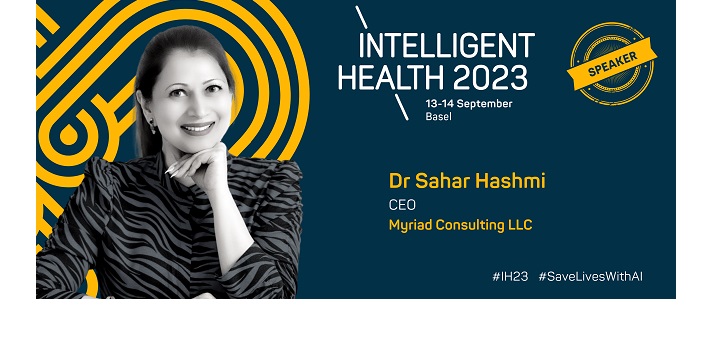Physical Address
304 North Cardinal St.
Dorchester Center, MA 02124
Physical Address
304 North Cardinal St.
Dorchester Center, MA 02124

Dr. Sahar Hashmi, MD-PhD, CEO of Myriad Consulting LLC, has expertise in AI in healthcare, digital health, data science, and AI business, with a special emphasis on generative AI applications. Dr. Hashmi served as a faculty member at Harvard University, teaching a graduate-level course on “Technology Integrations and Innovations in AI Applications.”
This course also discussed the business aspects of AI applications and included predictions about OpenAI’s ChatGPT launch well before it emerged as a competitor to Google search last year in November 2022. Dr.Hashmi contributes prominently to the prestigious Entrepreneur magazine in the US on topics related to generative AI applications in enterprises and the roles big tech giants play in healthcare and AI in healthcare generally. https://www.entrepreneur.com/author/sahar-hashmi
At the recent Intelligent Health conference (IHC) held in Switzerland in September 2023, organized by Inspiredminds, her talk highlighted the potential use cases of AI in healthcare. Dr. Sahar Hashmi was briefly interviewed by UAE news regarding the AI in healthcare experts panel discussion in which she was one of the invited AI expert speakers.
Dr. Sahar Hashmi was an expert speaker on a panel about AI in healthcare, which also included industry and academic professionals from Harvard Medical School. During this discussion, she examined the roles that big tech giants like Microsoft, OpenAI, Google, Apple, and Amazon play in capturing the healthcare consumer market.
Dr.Hashmi mentioned that OpenAI has indeed opened significant opportunities for humanity to further enhance generative AI applications, leading to the development of cutting-edge technology applications by numerous generative AI developers worldwide. Dr. Hashmi then elaborated on how hospitals, clinics, and all healthcare stakeholders could harness advanced AI applications in today’s healthcare delivery system. This will reduce the burden of administrative work and potentially prevent burnout in the healthcare system. It is the accessibility of medical information through generative AI applications like ChatGPT that will transform how we deliver care in the healthcare system. Whether it’s summarizing patient notes for physicians, predicting the best treatment option based on patient history, or simply serving as the knowledge assistant for the stakeholders of the healthcare system.
She emphasized that while the integration of newer algorithms or generative AI applications into hospital EMR systems may seem appealing, leadership teams and investors must be aware of potential consequences. Examples include application failure or undisclosed limitations to scale, others include overpromising and underperforming. Hence, it’s crucial to make informed decisions when selecting the most appropriate and reliable vendor to efficiently automate tasks within the healthcare delivery system.
Dr.Sahar Hashmi mentioned that all experts concurred with her observation that, in addition to concerns about safety, privacy, and hallucinations, there’s a significant liability concern, around the globe, when using generative AI applications in the healthcare system, putting all stakeholders at risk. If a chatbot, algorithm, or plugin app errs or provides incorrect recommendations or information, who will be held accountable? While she strongly believes in the potential of these AI applications, the experts agreed that some form of laws must be in place before healthcare stakeholders feel comfortable using generative AI in clinical settings, where patient care and safety are paramount.
In concluding the discussion, when questioned about AI and robots possibly replacing physicians and staff members in the future, she was resolute in her belief. While AI can certainly alleviate much of the redundant labor and administrative tasks for physicians and staff members, the notion of fully replacing them is far from reality. Nonetheless, she acknowledged that fields like diagnostic radiology and pathology might witness shifts in physician services in the coming decade.